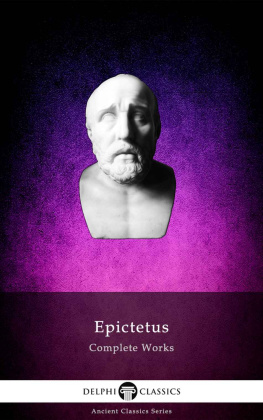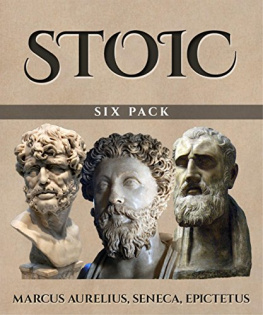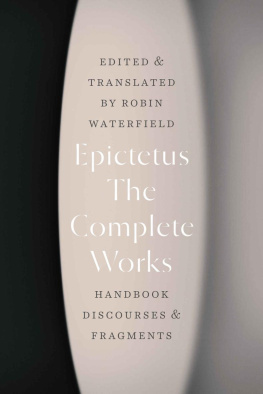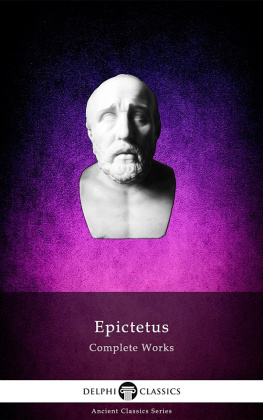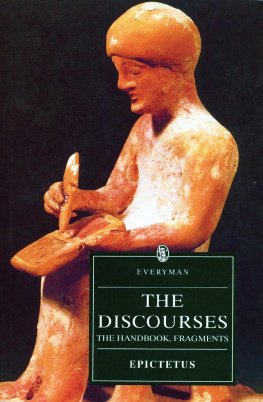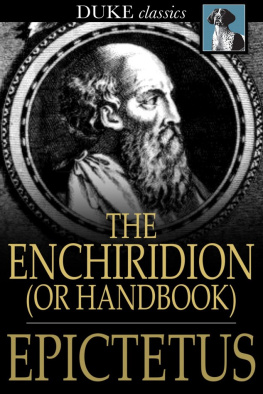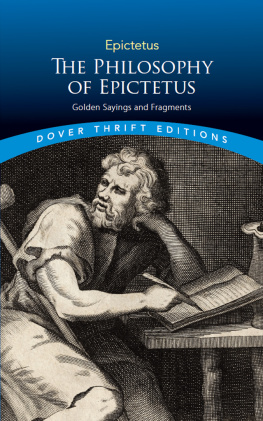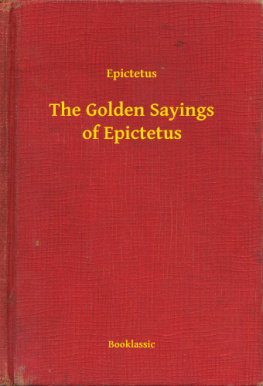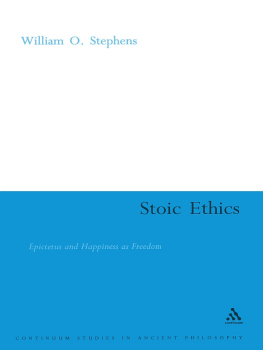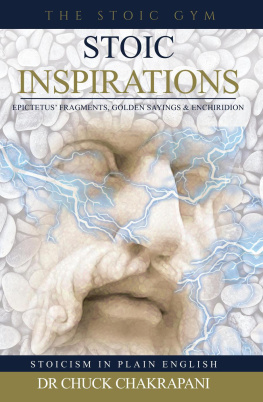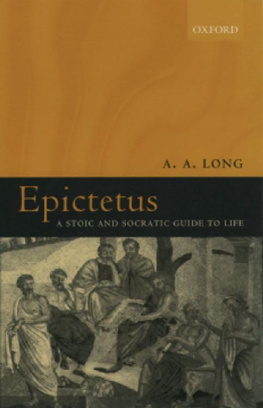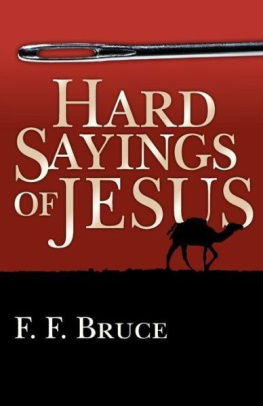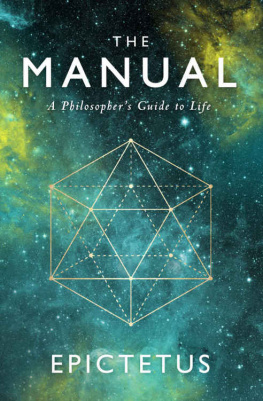Epictetus - Golden Sayings
Here you can read online Epictetus - Golden Sayings full text of the book (entire story) in english for free. Download pdf and epub, get meaning, cover and reviews about this ebook. genre: Science. Description of the work, (preface) as well as reviews are available. Best literature library LitArk.com created for fans of good reading and offers a wide selection of genres:
Romance novel
Science fiction
Adventure
Detective
Science
History
Home and family
Prose
Art
Politics
Computer
Non-fiction
Religion
Business
Children
Humor
Choose a favorite category and find really read worthwhile books. Enjoy immersion in the world of imagination, feel the emotions of the characters or learn something new for yourself, make an fascinating discovery.
Golden Sayings: summary, description and annotation
We offer to read an annotation, description, summary or preface (depends on what the author of the book "Golden Sayings" wrote himself). If you haven't found the necessary information about the book — write in the comments, we will try to find it.
Golden Sayings — read online for free the complete book (whole text) full work
Below is the text of the book, divided by pages. System saving the place of the last page read, allows you to conveniently read the book "Golden Sayings" online for free, without having to search again every time where you left off. Put a bookmark, and you can go to the page where you finished reading at any time.
Font size:
Interval:
Bookmark:
The Project Gutenberg EBook of The Golden Sayings of Epictetus, by Epictetus
This eBook is for the use of anyone anywhere at no cost and with
almost no restrictions whatsoever. You may copy it, give it away or
re-use it under the terms of the Project Gutenberg License included
with this eBook or online at www.gutenberg.org
Title: The Golden Sayings of Epictetus
Author: Epictetus
Translator: Hastings Crossley
Release Date: February 5, 2006 [EBook #871]
Language: English
*** START OF THIS PROJECT GUTENBERG EBOOK THE GOLDEN SAYINGS OF EPICTETUS ***
Produced by David P. Steelman and David Widger
I II III IV V VI VII VIII IX X XI XII XIII XIV XV XVI XVII XVIII XIX XX XXI XXII XXIII XXIV XXV XXVI XXVII XXVIII XXIX XXX XXXI XXXII XXXIII XXXIV XXXV XXXVI XXXVII XXXVIII | XXXIX XL XLI XLII XLIII XLIV XLV XLVI XLVII XLVIII XLIX L LI LII LIII LIV LV LVI LVII LVIII LIX LX LXI LXII LXIII LXIV LXV LXVI LXVII LXVIII LXIX LXX LXXI LXXII LXXIII LXXIV LXXV LXXVI | LXXVII LXXVIII LXXIX LXXX LXXXI LXXXII LXXXIII LXXXIV LXXXV LXXXVI LXXXVII LXXXVIII LXXXIX XC XCI XCII XCIII XCIV XCV XCVI XCVII XCVIII XCIX C CI CII CIII CIV CV CVI CVII CVIII CIX CX CXI CXII CXIII CXIV | CXV CXVI CXVII CXVIII CXIX CXX CXXI CXXII CXXIII CXXIV CXXV CXXVI CXXVII CXXVIII CXXIX CXXX CXXXI CXXXII CXXXIII CXXXIV CXXXV CXXXVI CXXXVII CXXXVIII CXXXIX CXL CXLI CXLII CXLII CXLIV CXLV CXLVI CXLVII CXLVIII CXLIX CL CLI CLII | CLIII CLIV CLV CLVI CLVII CLVIII CLIX CLX CLXI CLXII CLXIII CLXIV CLXV CLXVI CLXVII CLXVIII CLXIX CLXX CLXXI CLXXII CLXXIII CLXXIV CLXXV CLXXVI CLXXVII CLXXVIII CLXXIX CLXXX CLXXXI CLXXXII CLXXXIII CLXXXIV CLXXXV CLXXXVI CLXXXVII CLXXXVIII CLXXXIX |
(APPENDIX A) Fragments Attributed to Epictetus |
I II III IV V | VI VII VIII IX X | XI XII XIII XIV XV | XVI XVII XVIII XIX XX | XXI XXII XXIII XXIV |
(APPENDIX B) The Hymn of Cleanthes |
Are these the only works of Providence within us? What words suffice to praise or set them forth? Had we but understanding, should we ever cease hymning and blessing the Divine Power, both openly and in secret, and telling of His gracious gifts? Whether digging or ploughing or eating, should we not sing the hymn to God:
Great is God, for that He hath given us such instruments to till the ground withal: Great is God, for that He hath given us hands and the power of swallowing and digesting; of unconsciously growing and breathing while we sleep!
Thus should we ever have sung; yea and this, the grandest and divinest hymn of all:
Great is God, for that He hath given us a mind to apprehend these things, and duly to use them!
What then! seeing that most of you are blinded, should there not be some one to fill this place, and sing the hymn to God on behalf of all men? What else can I that am old and lame do but sing to God? Were I a nightingale, I should do after the manner of a nightingale. Were I a swan, I should do after the manner of a swan. But now, since I am a reasonable being, I must sing to God: that is my work: I do it, nor will I desert this my post, as long as it is granted me to hold it; and upon you too I call to join in this self-same hymn.
How then do men act? As though one returning to his country who had sojourned for the night in a fair inn, should be so captivated thereby as to take up his abode there.
"Friend, thou hast forgotten thine intention! This was not thy destination, but only lay on the way thither."
"Nay, but it is a proper place."
"And how many more of the sort there may be; only to pass through upon thy way! Thy purpose was to return to thy country; to relieve thy kinsmen's fears for thee; thyself to discharge the duties of a citizen; to marry a wife, to beget offspring, and to fill the appointed round of office. Thou didst not come to choose out what places are most pleasant; but rather to return to that wherein thou wast born and where wert appointed to ba a citizen."
But I have one whom I must please, to whom I must be subject, whom I must obey:God, and those who come next to Him. He hath entrusted me with myself: He hath made my will subject to myself alone and given me rules for the right use thereof.
Rufus used to say, If you have leisure to praise me, what I say is naught. In truth he spoke in such wise, that each of us who sat there, though that some one had accused him to Rufus:so surely did he lay his finger on the very deeds we did: so surely display the faults of each before his very eyes.
But what saith God?"Had it been possible, Epictetus, I would have made both that body of thine and thy possessions free and unimpeded, but as it is, be not deceived:it is not thine own; it is but finely tempered clay. Since then this I could not do, I have given thee a portion of Myself, in the power of desiring and declining and of pursuing and avoiding, and is a word the power of dealing with the things of sense. And if thou neglect not this, but place all that thou hast therein, thou shalt never be let or hindered; thou shalt never lament; thou shalt not blame or flatter any. What then? Seemth this to thee a little thing?"God forbid!"Be content then therewith!"
And so I pray the Gods.
What saith Antisthenes? Hast thou never heard? It is a kingly thing, O Cyrus, to do well and to be evil spoken of.
"Aye, but to debase myself thus were unworthy of me."
"That," said Epictetus, "is for you to consider, not for me. You know yourself what you are worth in your own eyes; and at what price you will sell yourself. For men sell themselves at various prices. This was why, when Florus was deliberating whether he should appear at Nero's shows, taking part in the performance himself, Agrippinus replied, 'But why do not you appear?' he answered, 'Because I do not even consider the question.' For the man who has once stooped to consider such questions, and to reckon up the value of external things, is not far from forgetting what manner of man he is. Why, what is it that you ask me? Is death preferable, or life? I reply, Life. Pain or pleasure? I reply, Pleasure."
Font size:
Interval:
Bookmark:
Similar books «Golden Sayings»
Look at similar books to Golden Sayings. We have selected literature similar in name and meaning in the hope of providing readers with more options to find new, interesting, not yet read works.
Discussion, reviews of the book Golden Sayings and just readers' own opinions. Leave your comments, write what you think about the work, its meaning or the main characters. Specify what exactly you liked and what you didn't like, and why you think so.


